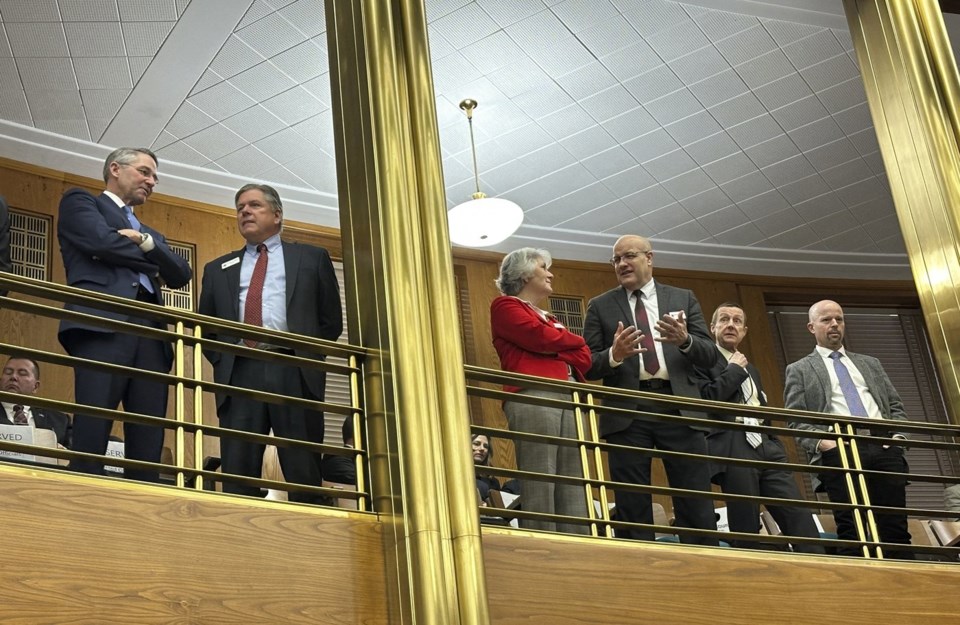BISMARCK, N.D. (AP) — North Dakota’s abortion ban will not be enforced while the state appeals an earlier decision that found it unconstitutional, the state's highest court ruled Friday.
That appeal has yet to fully play out in the state Supreme Court after a judge struck down the law in September.
North Dakota has had no abortion providers since the only one moved from Fargo to neighboring Moorhead, Minnesota, in 2022. The only scenarios in which North Dakotans can currently obtain an abortion in the state would be for life- or health-preserving reasons at a hospital.
The plaintiffs had contended that keeping the overturned ban from being enforced was important for patients with pregnancy complications who go to a hospital seeking medical care that might be delayed because of the law.
Attorneys for the state had asked the North Dakota Supreme Court to let the ban be enforced pending appeal. They said a stay “is warranted because this case presents serious, difficult, and unresolved constitutional questions that are of profound importance to the people of this State,” among other reasons.
State District Judge Bruce Romanick had earlier denied such a request, saying: “It would be non-sensical for this Court to keep a law it has found to be unconstitutional in effect pending appeal.”
The Center for Reproductive Rights, which represents the abortion clinic and several physicians who challenged the law, opposed enforcement of the overturned ban. The court heard oral arguments on the state’s request in November.
In the three-member majority opinion, Justice Daniel Crothers cited several legal reasons against the state's arguments, writing at one point: “The upshot of the State’s argument is that any decision that recognizes a previously unobserved constitutional right should warrant a stay. We reject the request to adopt such a tenuous connection between the proposition advanced by the State and our precedent.”
The plaintiffs welcomed the decision.
“Today’s decision to keep the abortion ban blocked was the only logical outcome," Meetra Mehdizadeh, senior staff attorney at the center, said in a statement. "People are dying without access to abortion, and still the State sought to stop pregnant North Dakotans facing dangerous situations from getting the care they need. It’s shameful. We will not stop fighting until this ban is struck down once and for all.”
In a statement, North Dakota Attorney General Drew Wrigley said: "This is only a decision on the stay motion, not on the constitutional merits of the legislation. North Dakota will continue moving forward to fully litigate this matter before the state Supreme Court, where we intend to establish that the law passed by our legislature is clearly constitutional."
The case has had a winding road since the Red River Women’s Clinic initially challenged the state’s previous abortion ban in the wake of the U.S. Supreme Court overturning Roe v. Wade in 2022.
In 2023, North Dakota’s Republican-controlled Legislature revised the state’s abortion laws. That law criminalized the performance of an abortion as a felony, with the only exceptions to save the life of a mother or to prevent a “serious health risk” to her. The ban also allowed for abortions in cases of rape or incest but only up to six weeks gestation, which is often before many women know they are pregnant. The plaintiffs said the law was unconstitutionally vague and its health exception too narrow.
Republican state Sen. Janne Myrdal, who introduced the 2023 bill that became law, said she doesn't view Friday's decision as a setback.
“It's not a reflection of the validity of the constitutionality of the law ... and I don't read anything more into that fact, actually," Myrdal said.
A Center for Reproductive Rights spokesperson said the clinic has no current plans to return to North Dakota.
Jack Dura, The Associated Press


